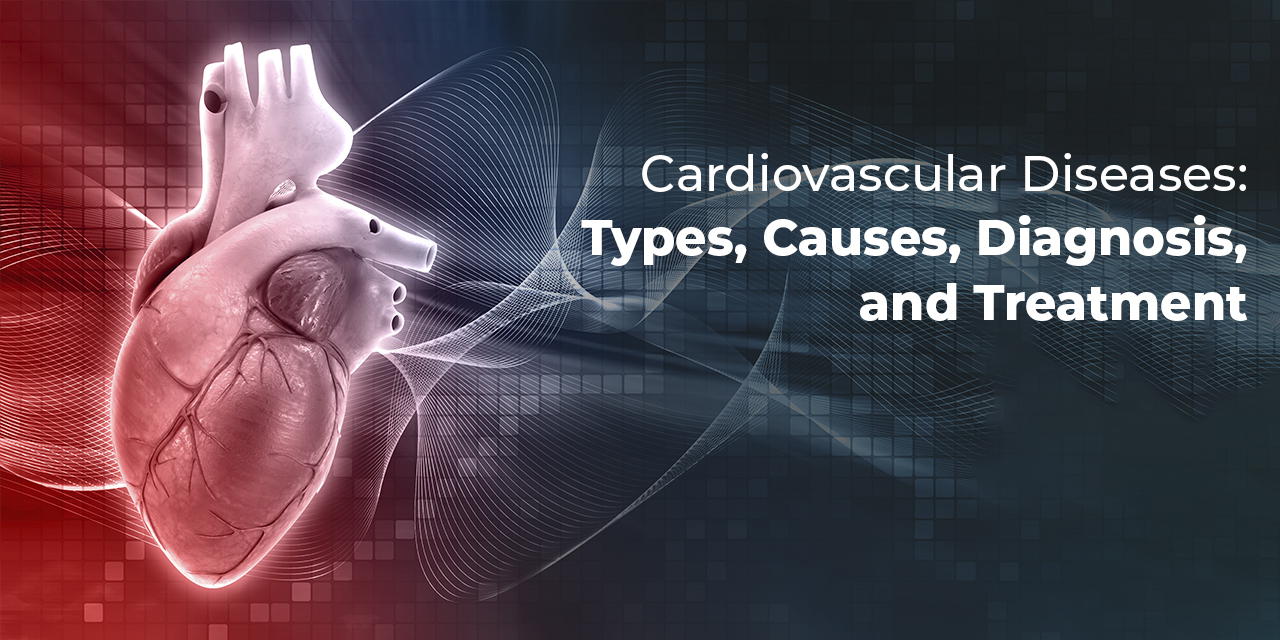Introduction
Cardiovascular diseases (CVDs) are heart and blood vessels (arteries, veins, and capillaries) related disorders that affect the structure and function of the heart. They are the leading cause of death worldwide. However, most heart diseases can be prevented with healthy lifestyle choices. If they do occur, there are also many treatment options available to improve the quality of life and life expectancy of the patient. Moreover, it is very important to diagnose the type of cardiovascular disease as early as possible so that it can be timely managed with medicines and counseling.
This blog covers different types of cardiovascular diseases, their causes, symptoms, diagnosis, and treatment.
Following Are The Common Types of Cardiovascular Diseases:
- Cerebrovascular disease – It is a condition affecting blood vessels that supply blood to the brain;
- Arrhythmia – This condition causes an irregular heart rhythm or heartbeat;
- Coronary artery disease – It causes the narrowing of the arteries that supply blood to heart muscles;
- Heart muscle disease – It causes conditions including dilated and hypertrophic cardiomyopathy;
- Heart valve disease – It causes conditions such as mitral valve regurgitation, aortic stenosis, and mitral valve prolapse;
- Vascular diseases – It includes peripheral artery disease, Raynaud’s disease, atherosclerosis, aneurysm, renal artery disease, peripheral venous disease, blood clotting disorders, venous blood clots, and Buerger’s disease;
- Rheumatic heart disease – A streptococcal bacteria cause rheumatic fever that leads to damage of heart valves and muscles;
- Radiation heart disease – It causes damage to the blood vessels and heart valves by emission of strong radiation to the chest;
- Congenital heart disease – It is the structural heart defects present since birth; and
- Pulmonary embolism and deep vein thrombosis – Dislodging of blood clots formed in the leg veins which move to the heart or lungs.
Other Heart-related Conditions Include:
Angina – Chest pain caused due to the reduced blood supply to the heart
Heart attack – It is an acute event wherein there is a sudden blockage of oxygen-rich blood supply to the heart
Heart failure – Occurs when the heart functioning is impaired
Stroke – It causes interruption of blood flow to the brain cells because of blood clots or bleeding from blood vessels
Marfan syndrome – It is a rare, occurring genetic disorder that affects connective tissue.
Heart infection (Endocarditis).
What Are The Causes Of Cardiovascular Diseases?
The causes of cardiovascular disease depend upon the type of heart disease the person is suffering from. Many heart diseases are the result of atherosclerosis (fatty plaque build-up in arteries). The circulatory system can also get damaged by health concerns like diabetes, obesity, an infection, structural heart defect i.e. present since birth, or myocarditis (inflammation of heart muscles). Cardiovascular disease is also often caused by hypertension. There are also behavioral risk factors like an unhealthy diet, physical inactivity, tobacco use, and drug or alcohol abuse.
Common Symptoms Of Cardiovascular Diseases:
- Pressure or pain felt in the chest
- Shortness of breath
- Fatigue and nausea
- Cold sweat
- Dizziness or lightheadedness
- Discomfort or pain in elbows, arms, back, left shoulder, and jaw.
Cardiovascular Diseases Diagnosis:
Initially, a physical examination is done and the family or personal medical history of the patient is reviewed. The diagnostic tests that can be recommended are blood tests, chest X-rays, ECG, Echocardiogram, Stress test, Holter monitoring, cardiac CT scan, cardiac MRI, and cardiac catheterization.
Where Can You Buy Cardiac Ultrasound or ECG Units?
Trivitron Healthcare offers a huge range of cardiology ultrasounds and ECGs that looks specifically at the patient heart and blood vessels. These imaging units can be used to assess the function of different parts of the cardiovascular system. These echocardiograms can help cardiologists to access even congenital heart defects.
To know more please visit https://www.trivitron.com/specialty/cardiology .
Cardiovascular Diseases Treatment:
The treatments of cardiovascular diseases vary among patients based on the type of condition. Generally, these may include:
Lifestyle changes : The patient can reduce the potential risk of heart disease by having a heart-healthy diet (low fat and sodium and more fresh fruits and vegetables), quitting smoking, avoiding a sedentary lifestyle by doing at least 30 minutes of moderate exercise daily, and limiting the alcohol intake.
Medications : These usually include the ones that treat risk factors such as cholesterol and high blood pressure or those that help dissolve blood clots. The type of medicine must be prescribed by a cardiologist only and can vary from patient to patient depending upon the type of cardiovascular disease.
Medical procedures or surgeries : If both lifestyle modifications and medications aren’t enough, the possibility is that the cardiologist will recommend specific procedures or surgery. These include placing of stent or balloon in the blocked/narrowed blood vessel, coronary artery bypass graft surgery, or heart-valve surgery. The type of medical procedure or surgery performed depends upon the type of cardiovascular disease and the extent of heart damage.

